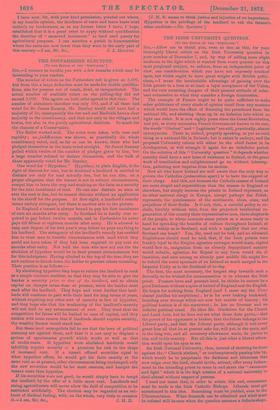THE FORFARSHIRE ELECTION.
[TO THE EDITOR OF THE " SPEOTATOILl
Sra,—I venture to trouble you with a few remarks which may be interesting to your readers.
The number of voters on the Forfarshire roll is given as 3,600, but from this a large deduction must be made for double qualifica- tions, also for persons out of reach, dead, or incapacitated. The actual number of available voters on the polling-day did not exceed 2,900. The agents on both sides agreed in this view. The number of abstainers therefore was only 300, and if all these had voted for Sir James Ramsay, Mr. Barclay would still have had a majority of 50, consequently the out-and-out Radicals have a clear majority in the constituency, and that not only in the villages and towns, but also in the purely agricultural districts. So much for the chances of a Conservative.
The Ballot worked well. The votes were taken with ease and rapidity ; no „indifference was shown, as practically the whole constituency voted, and, as far as can be known, those who had pledged themselves in the main voted straight. Sir James Ramsay polled within twelve of the number of pledges given to him, but a large number refused to declare themselves, and the bulk of these apparently voted for Mr. Barclay.
One word for " Hypothec." Hypothec, in plain English, is the right of distress for rent, but in Scotland a landlord is entitled to distrain not only for rent actually due, but he can also, on a proper allegation that the tenant is not in solvent circumstances, compel him to leave the crop and stocking on the farm as a security for the next instalment of rent. He can also distrain as soon as ever the rent is doe, but he cannot distrain without an application to the sheriff for the purpose. At first sight, a landlord's remedy seems unduly stringent, but there is another aide to the picture.
In England a tenant is always bound to pay his first instalment of rent six months after entry. In Scotland he is hardly ever re- quired to pay before twelve months, and in Forfarshire he never pays till fifteen or eighteen months after entry. He is allowed to reap and dispose of his first year's crop before he pays anything to his landlord. The stringency of the landlord's remedy has enabled him to trust men in humble circumstances with land which they could not have taken if they had been required to pay rent six months after entry. Not half the men who now cry out for the abolition of hypothec would be in their present circumstances but for this indulgence. Having climbed to the top of the tree, they are now anxious to knock down the ladder to prevent others mounting. Their position is as follows :- By abolishing hypothec they hope to reduce the landlord to rank as a simple contract creditor, so that they may be able to give the banker a security prior to that of the landlord, and so obtain capital on cheaper terms than at present, when the banker must rank after the landlord. They hope and trust further that land- lords will continue to part with their land for long terms of years, without requiring any other sort of security in lieu of hypothec, and they hope also that the weakening of the landlord's security will not lead to any enhancement of rent. They trust that the competition for farms will be limited to men of capital, and they reckon with some reason that if landlords should require security, the wealthy farmer would stand beet.
But these land monopolists fail to see that the laws of political economy are against them, and that- it is not easy to displace a system of spontaneous growth which works so well as that of credit-rents. If hypothec were abolished landlords would infallibly require security or a premium for risk in the shape of increased rent. If a tenant offered securities equal to what hypothec offers, he would get his farm exactly at the same rent as at present, other circumstances being unchanged, only the new securities would be far more onerous, and hamper the tenant more than hypothec.
If his securities were not good, he would simply have to tempt the landlord by the offer of a little more rent. Lendlords and
rising agriculturists will never allow the field of competition to be restricted artificially. The election may be regarded as an out- burst of Radical feeling, with, on the whole, very little to occasion
[J. H. R. seems to think justice and injustice of no importance. Hypothec is the privilege of the landlord to rob the farmer's other creditors.—En. Spectator.]






































 Previous page
Previous page